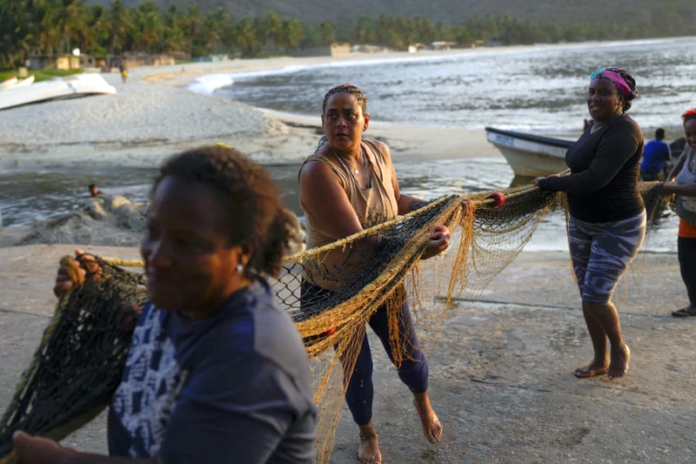Abstract
-
Venezuelan women are increasingly taking up the physically demanding work of fishing in the Caribbean.
-
The job, which pays $8 after five consecutive 12-hour shifts, is more than the nationwide $5 monthly minimum wage.
-
The women are gaining the respect of men with whom they now work to catch thousands of pounds of fish a day.
Venezuelan Women Embrace the Grueling Work of Fishing in the Caribbean
In the coastal communities of Choroni and neighboring Chuao in Venezuela, venezuelan women are increasingly joining the ranks of fishermen. The physically demanding work, which involves catching thousands of pounds of fish a day, is now being embraced by women who have lost their jobs due to Venezuela’s economic crisis or are continuing a family tradition of fishing.
The Rigors and Rewards of Fishing
Fishing is a grueling job that requires patience, agility, and courage. The fishermen and fisherwomen work in teams of four or five boats, throwing a large net with some bait in the middle, which is then monitored regularly by a team diver. When a shoal is spotted, a smaller net is thrown and the team begins to close it by pulling a drawstring-like line. The more they pull, the closer their boats get to each other, allowing them to move the fish from the smaller net to their boats. The fish is sold the same day at a nearby market.
The Role of Women in Fishing
Women, who were once relegated to cooking or cleaning at hostels, bed-and-breakfasts, and diners, are now gaining the respect of men with whom they work. Some women have even become boat owners. Fisherwomen rely on each other and their parents to care for their children while they are at sea, ensuring that no woman misses a fishing shift.
The Economic Reality of Fishing
Despite the physical demands and risks associated with fishing, the job pays $8 after five consecutive 12-hour shifts, more than the nationwide $5 monthly minimum wage. However, living off fishing alone is nearly impossible, and many fisherwomen supplement their income with other jobs.
The Human Cost of Fishing
Fishing is not only physically demanding but also fraught with danger. Carolina Chávez, who started fishing at age 11 because her family needed food, nearly lost her left hand when it became entangled with a rope as she and others tried to lift a heavy net. Despite the accident, she returned to fishing shortly after, as her family would go hungry if she stopped working.
The Community of Fisherwomen
In these coastal communities, women support each other, stepping up to ensure that no woman misses a fishing shift. The community is both machista and matriarchal, with women holding significant roles in the fishermen’s councils and owning boats. This mutual support extends beyond work, with women offering to care for each other’s children while they are at sea.
Beyond Fishing: The Pursuit of Additional Income
Despite the income from fishing, it is nearly impossible to live off fishing alone. Many fisherwomen, like Greyla Aguilera, who holds law and culinary degrees, supplement their income with other jobs. Aguilera tutors young children, teaches English lessons to older ones, photographs baptisms and first communions, and is now testing recipes with hopes of opening a café.
Conclusion
The increasing number of Venezuelan women taking up the grueling work of fishing in the Caribbean is a testament to their resilience and adaptability. Despite the physical demands and risks, these women are not only earning a living but also breaking barriers in a traditionally male-dominated field. Their story is a powerful reminder of the strength and determination of women in the face of adversity.









